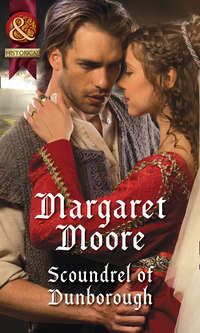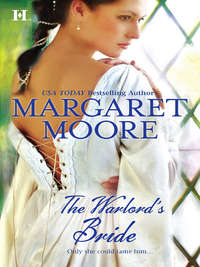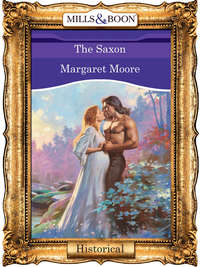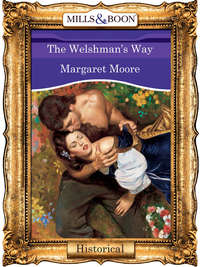
Полная версия
Castle of the Wolf
God help her if this was so, and yet she must marry Blane. For Mavis’s sake she had agreed, and for Mavis’s sake, she must honor that pledge.
And she had to get away from Rheged. It would do her no good to listen to him. To be with him. To let him take her in his arms and kiss her passionately.
Yet it seemed as if every muscle in her body had turned to water when she tried to leave. She stumbled and nearly fell, until Rheged took hold of her shoulders to steady her.
“I don’t say these things to frighten you, my lady,” he said quietly, his gaze searching her face. “I seek only to warn you, and protect you. If you don’t believe what I’ve said about Blane, ask some of the other guests here about him. Even if they praise him, they will hesitate before they do, and the hesitation will tell you that I speak the truth.” His grip on her shoulders tightened. “Whatever your uncle’s promised, you have the right to refuse. You cannot, by law, be compelled to marry.”
It was like a lifeline thrown to a drowning man who must choose whether to grab it himself or save the one member of his family who loved him, and whom he loved. “Let go of me, Sir Rheged.”
He did, and then he moved to block the door. “I have talked with priests on my travels about many things. I’m as certain as I’m standing here that you cannot be forced to marry against your will.”
She believed him, yet if he spoke the truth about Blane, it was more important than ever that she marry him and not Mavis.
So Tamsin straightened her shoulders and faced Rheged squarely. “Did I say I was being forced? Did I complain the betrothal was without my consent? I am going to marry a rich man who will give me rank and a comfortable household, as well as create an alliance between my uncle and a man with power in the north.”
“Who will make your life a living hell.”
“What woman doesn’t want a household of her own, and children?” she demanded, even though the thought of sharing Sir Blane’s bed filled her with revulsion. “As for his alleged evil, surely you don’t think my uncle would—”
“I think your uncle will do whatever he thinks will serve his own ends,” Rheged interrupted, “and I think you, my lady, know that far better than I.”
“So you say. But I may find it easier to please a husband than my uncle.”
“How? In his bed? I doubt any woman has ever found happiness in Blane’s bed.”
“No doubt you would prefer I shared yours.” She forced away the sudden, vivid image of being in Rheged’s bed, in his arms, loving him and being loved, just like her dream last night. “You have a novel method of seduction, I grant you, but it will not succeed with me.”
“I don’t want to seduce you,” he retorted. “I truly wish to help you, my lady.”
His sincerely spoken words made it all the more difficult for her to pretend to be unmoved by his offer, and his compassion. “I thank you for your concern, sir knight,” she said, keeping her voice cold, “but my fate is my own business, so unless you intend to keep me here against my will, you will let me go.”
“Leave, then,” he replied just as coldly, obviously angry now and with good cause—or so she thought until she put her hand on the latch.
“If you change your mind,” he said with a quiet, yet firm, resolve, “send word to Cwm Bron and I will come for you and take you anywhere you choose to go, whether to a friend, or a relative’s or a convent—any place of sanctuary where your uncle cannot compel you to marry against your will.”
She had to get away from him before her resolve crumbled into dust, yet she couldn’t go without some sign that she was grateful. That she appreciated and cherished his offer. That she respected and admired him for more than his looks and prowess in battle, although those were considerable.
That she wished they had met in different circumstances. That she was free, or even a maidservant, so that she could go to his bed and no one would bat an eye.
So she kissed him. Passionately. Letting loose, for just this once, all the need and longing and desire he aroused within her.
Just this once, so she would have something to remember in the long, lonely nights to come.
Just this once, since she would surely find nothing but selfish, demanding lust in Sir Blane’s bed.
Just this once, to show Rheged how she truly felt while he held her close and his lips moved over hers with slow, sure deliberation and desire.
Nevertheless this kiss must end, lest she forget who and what she was, and what she had to do to keep her cousin safe. She simply could not succumb to the need and yearning coursing through her, no matter how much she wished he would lay her on the fleece and have his pleasure of her, for loving him would surely give her pleasure, too.
She forced herself to release him. “We will forget we ever met here, Sir Rheged, and we will not speak of my marriage again. Now I give you good night, sir, and may you have a safe journey home.”
“My lady—”
“Enough, Sir Rheged!” she cried, her words a plea as much as an order. “I will marry Sir Blane and you will go back to Cwm Bron.” Her voice softened. “It must be so, my lord, so please respect my wishes.”
“Very well, my lady, and may you have more joy in your marriage than I foresee,” he replied as she opened the door and left him.
* * *
Rheged slumped back against one of the large bundles of wool. Perhaps the lady truly did want to marry a man of wealth and position, regardless of who he was, or the toll it might take upon her. If so, that was her decision, and he must abide by it.
He went to open the door, then hesitated. He was sure no one had been watching when he called out her name and that they’d been shielded from prying eyes in the doorway. Nevertheless it might be wise to wait awhile yet before leaving. It could mean trouble for them both if people knew they’d been together in the woolshed, even for a short time.
With a sigh, he climbed onto the bundles of fleece and stretched out, sinking down with a sigh. He would to stay here a little longer. After all, he’d wanted to save her from her troubles, not add to them.
* * *
Still holding the empty basket, Tamsin hurried to the small chamber she shared with Mavis. She didn’t go back to the kitchen where a host of servants would be, nor to the hall, where all the lords and ladies were still gathered. She ran like a frightened deer or a mouse that sees a cat to the servants’ stairs leading to the family chambers. Mercifully she met no one as she dashed up the steps, or in the corridor. Panting, she opened the door—to find her cousin already there, her hands clasped anxiously before her and a worried expression on her lovely face.
Mavis’s expression grew even more concerned as she looked from Tamsin’s startled visage to the empty basket in her hands.
“I was so busy thinking about all the guests leaving tomorrow, I forgot to return this,” Tamsin said, her excuse sounding weak even to herself.
“I was right—you are ill!” Mavis cried, taking the basket from Tamsin and setting it down on the nearby dressing table. “You’re flushed and out of breath and you were so quiet during the feast.”
“I’m not usually a font of merriment,” Tamsin noted with a smile only slightly forced as she picked up a taper and stuck it in the brazier warming the small chamber. “I was thinking about the cook. Armond may have to go. He struck the spit boy, and if he does it again—”
“I’ve seen you worried about household matters many times before, and this is different,” Mavis interrupted, blocking Tamsin’s way as she went to light the rushlight beside Mavis’s curtained bed. Tamsin’s smaller cot was on the other side of the room, along with the small chest that held her few gowns. Mavis’s clothes were in a much larger chest at the foot of her bed.
Mavis put her hand on Tamsin’s forehead before she could move away. “No fever, thank God, but you must go to bed and rest before you fall seriously ill. I’ll do what must be done tomorrow while you rest—and I won’t allow you to refuse!” she added, looking as stern as it was possible for cheerful, pretty Mavis to look.
Which was not nearly so stern as Sir Rheged. But Tamsin would not, must not, think of him. And it would be better if she kept busy tomorrow, away from the guests.
“I’m quite all right,” she replied, moving farther into the room.
“No, you’re not,” her cousin insisted. “Something is wrong.” She went to Tamsin and put her hands on her shoulders, turning her to face her, her anxious gaze searching Tamsin’s face. “Please, Tamsin, won’t you tell me? I come to you with all my troubles, as if you were my sister. Won’t you treat me like a sister and tell me yours?”
If she had demanded the truth, Tamsin would have resisted. But this tender, heartfelt plea, from the cousin who had been the only one to welcome her with kindness when she first came to Castle DeLac, and from whom she would soon be parted, proved irresistible. “Your father was going to wait until tomorrow to make the announcement.”
Mavis’s blond eyebrows drew together in a query as Tamsin forced another smile onto her face. Mavis must never know what her father had threatened if Tamsin refused the betrothal. Mavis was a loving, loyal soul and Tamsin didn’t doubt that she would insist on taking Tamsin’s place if she knew the truth. “I am to be married.”
“Married?” Mavis repeated, as shocked as Tamsin had been. Or Sir Rheged. And no doubt as everyone else in Castle DeLac would be, too, when the news got out. “When? To whom? Is it one of the visiting knights? Sir Jocelyn?”
“No, it’s—”
“Not young Sir Robert. He’s barely twenty.”
“It isn’t one of our guests. It’s Sir Blane of Dunborough.”
“Sir Blane of...” Mavis repeated. Then her eyes widened and a look of horror came to her face. “Not that terrible old lecher! It made my skin crawl just to look at him! Surely Father wouldn’t be so cruel!”
Tamsin drew herself and spoke as she had to Sir Rheged, with pride and resolve, so that Mavis would believe her. “He’s rich and powerful. It’s a much better match than I could have hoped for.”
“But you yourself saw the way he went after the maidservants. If you hadn’t kept them—and me—away from him—”
“Surely once he has a new, young wife he won’t want to dally with servants.”
“I don’t think marriage would ever stop a man like him from trying to take advantage of any woman. And he wouldn’t have a wife,” Mavis said. “He would have you. You would be in that disgusting old man’s bed, Tamsin.”
Better her than Mavis, Tamsin thought, her cousin’s compassionate concern making it all the more necessary that she wed Sir Blane. “I’m aware of a wife’s duties—all of them,” she said, meeting her cousin’s gaze with all the cool composure she could muster.
“It may not be pleasant, but if I’m to have children, I will do what I must, and I do want children,” she continued, trying not to imagine little boys with flashing brown eyes and dark hair, or little girls with thick lashes and long, waving black hair.
She took Mavis’s hands in hers. “This may be the only way I’ll ever have a household and children of my own. I’ll no longer be a beggar at my uncle’s table, a glorified servant who must be grateful for every mouthful.”
Mavis regarded her questioningly for a long moment, until at last she lowered her head and pulled her hands free. “If that’s how you feel, Tamsin, then I must be happy for you, and wish you well on your betrothal.”
“Thank you, my cousin, who is more than a sister to me,” Tamsin said, embracing her.
Mavis threw her arms about her and hugged her close.
* * *
Rheged awoke to pitch-darkness and the scent of wool. God’s blood, he’d fallen asleep in the woolshed.
He rolled off the bundle and onto his feet at once. Moving his stiff arms, he bent his knees and straightened, then brushed any bits of fleece from his tunic before raking his fingers through his hair.
He opened the door and peered into the yard. It was barely dawn, the yard empty and quiet, with only the footfalls of the guards on the walk to break the silence. Like a shadow, Rheged crept out of the shed and along the wall, stealthily making his way back to his quarters, more glad than ever that he had a chamber to himself.
On the other hand, he thought as he slipped through the outer door into the guest quarters, he might not be the only man sneaking into his chamber in the wee hours of the morning. If anyone saw him, they would likely think he’d been sporting with one of the servants, like that pretty wench with the pert nose who’d spent most of the feast near the squires. Nevertheless he was relieved to get to his chamber without encountering anyone else.
Once there, he checked to make sure his prize was safe, washed, changed his clothes and packed his belongings, including his mail, helmet, plain surcoat devoid of any devices or crest, and gambeson, the padded garment worn beneath his mail. That done, he went to the hall to break the fast.
The only people in the large chamber were some servants cleaning after last night’s feast, a few soldiers finishing their early meal of bread and ale and the hounds. Tamsin was not there, nor were any of the guests, Lady Mavis or Lord DeLac. No doubt the lords and ladies were still abed.
As one of the maidservants—not that pretty pert one, but an older one—brought him bread and ale, stifling a yawn as she did so, he told himself to be glad Tamsin wasn’t there. She had made her feelings quite clear, so there was nothing more to say to her.
Trying to put Tamsin from his thoughts, he ate slowly, savoring the excellent bread and fine ale, better than anything he would have at his own castle. He watched with hidden amusement as some of the other knights and squires stumbled into the hall, clearly the worse for feasting too much and too long last night. None of the ladies appeared.
That was to be expected, he supposed. But he did hope to see Tamsin bustling about, giving orders and seeing that all was well later, when he was preparing to depart. Yet he never so much as caught a glimpse of her in the hall, the guest quarters or the courtyard.
It was as if Tamsin had disappeared off the face of the earth. Or been locked away.
Chapter Four
Rheged immediately went back to the hall. If Tamsin was being punished because they’d been together last night, he must and would make certain Lord DeLac knew the lady was innocent of any indiscretion.
Well, perhaps she wasn’t entirely innocent, but she’d certainly done nothing worthy of punishment.
When he entered the hall, he saw at once that Tamsin wasn’t there, although more of the guests were, including a few of the ladies.
Deciding he would wait until Tamsin appeared or Lord DeLac arrived, Rheged sat on one of the benches halfway down the hall, away from anyone else. Not surprisingly, no one moved to sit near him. Only the servants addressed him, hurrying to offer him bread, honey, wine or ale. He waved them away and paid no heed to their curious regard any more than he did to the sideways glances the Normans gave him.
“Not like her at all,” he heard a woman say behind him. “Normally she’s calm as can be, even after a feast, but I swear to you, Denly, she fair tore a strip off Baldur this morning for not telling her they was running short of wine.”
Rheged moved farther back in the shadow of the pillar and looked over his shoulder. Two servants, a man and a woman, were replacing the torches in the sconces.
“No wonder she’s snappish,” the man remarked as he lifted down a burned-out torch. “Poor thing’s bone-tired. Not that she’s resting. She’s been in the storerooms all morning, checking the stores as if the king himself were coming.”
So it seemed Tamsin wasn’t being punished. She was going about her daily business, as if nothing at all had happened.
And so should he.
* * *
So Rheged was still telling himself early the next morning as he rode the last mile toward his fortress. He had spent the night encamped in a wood halfway between Castle DeLac and his estate, in a ruin of a coal burner’s hut he’d spotted when he ventured from the road seeking water for his horse. As was his habit after years of being on his own, he always carried flint and steel, and had a loaf of bread he’d slipped into his tunic before he left the hall at Castle DeLac that morning. That meant he was able to save the cost of a night at an inn, as well as the worry that some outlaw or thief might guess that he carried something of value and try to rob him. Not that any thief or highwayman would have succeeded. None ever had before, not even when he was a boy. He fought fiercely to keep what was his, and had first learned to fight not from some honorable knight, but on the streets and in the alleys of more places than he could remember. He could use anything that came to hand to defend himself, or simply his bare fists, if need be.
Thank God those days of living hand to mouth, of never knowing if he would eat that day or starve, of fighting over scraps or holding off any who would take what little he had, were over.
His heart swelled with pride and satisfaction when he rode over the ridge and saw his fortress rising from the autumn mist in the valley—the White Valley, Cwm Bron. To be sure, compared to Castle DeLac, his castle seemed small and more than a half a ruin, but this was only a beginning. One day, he would build a new and better fortress with a moat, at least two curtain walls, an inner and outer ward and a gatehouse with a portcullis. Inside, there would be a larger keep, stables, a hall and a chapel, too. The family apartments would be spacious and comfortable, finely furnished with beds and perhaps even a carpet in his own chamber. Farmers, tradesmen, craftsmen and merchants would feel safe and secure under his protection, and the village beyond the castle walls would grow and prosper, too.
Now, though, only a very small village of wattle-and-daub cottages and wooden buildings had grown around the single outer stone walls of his fortress. Inside the wall only the ancient round keep and one other building were made of stone. The others were wattle-and-daub, or timber, and several were in a sad state of disrepair. So far, he’d managed to have the work on the keep completed and the mill, farther down the river, repaired. Recently his men had started on the outer wall. Later, when it was finished, the work on the rest of the interior buildings would begin.
He could achieve his goals faster if he wed a wealthy woman. Not a titled lady, who would likely look down on a man of his origins, but a rich merchant’s daughter or sister.
With snapping brown eyes and hair to her waist.
He must stop thinking of Tamsin of DeLac. She must be nothing to him.
He surveyed the wall walk nearest the gate and thought he could make out the stocky Gareth, his friend and garrison commander. Gareth had no doubt been watching for his return, ready to ply him with questions about the tournament, the fighting and, being Gareth, the women.
Gareth had lost three of his bottom teeth in a skirmish, most of one eyebrow was nothing but a scar and his visage had been none too pretty to begin with. Despite his lack of physical attractiveness, however, he rarely had trouble finding female company, for he was as merry as Rheged was serious. Nevertheless they had been friends and comrades-in-arms for over fifteen years, from the time a half-drunk Gareth had tried to knock Rheged down and instead had fallen, laughing, into a horse trough.
As Rheged raised his hand in greeting, Sir Algar, white-haired and agile despite his years, came hurrying out of the open gate of Cwm Bron. Rheged hadn’t expected to find his overlord waiting for him, and he was pleased and flattered. And relieved, too, a little, for now Gareth’s questions would have to wait.
“Greetings, my lord!” Rheged called out, riding closer. Unlike Lord DeLac, Sir Algar was slender and although his long tunic, embossed leather belt and polished boots had surely been expensive, he wore few jewels.
“I couldn’t wait to find out who the champion of the tournament was,” Sir Algar cheerfully explained when Rheged swung down from his horse to walk beside him.
“I was.”
“I knew it!” Algar cried, slapping his thigh with delight. “I knew nobody’d beat you!”
“Nobody at that tournament anyway,” Rheged replied.
They’d no sooner entered the yard than Dan the groom hurried out of the stable as fast as his short legs could take him. Between his lack of height, potbelly and red face, the groom was rather like an apple with limbs. He was also honest and good at his job, and that was what counted with Rheged.
“Rub Jevan down well, and have my mail and surcoat taken to the armory for cleaning,” Rheged said, stroking his destrier’s nose.
Dan nodded and took hold of the reins while Rheged retrieved the smaller leather pouch that had also been tied to his saddle.
“Well, then, no limbs missing, I see,” Gareth noted wryly after he joined them, running his gaze up and down Rheged’s frame, which was as long and lean as his was short and brawny.
“No,” Rheged replied, apparently equally serious. “Only a few bruises.”
“And he won!” Sir Algar exclaimed.
“Can’t have been much of a competition, then,” Gareth observed.
“Not much,” Rheged answered with a shrug. “I see the fortress is still standing, so no trouble while I was gone, I take it?”
“Not a thing.”
Rheged noticed Sir Algar fidgeting. “Good. Tell the guards the watchword for the night is...woolshed.”
Gareth looked a little surprised, but he nodded and strolled off toward the men standing near the gate while Rheged, with Sir Algar beside him, started toward the keep.
“What did you make of Lord DeLac?” Sir Algar asked as they went up the steps to the second level in the building that served as Rheged’s hall. The chamber where he slept was on the third level, just below the new slate roof.
“Rich and prosperous and pleased with himself,” Rheged replied as they entered. This room was half the size of Lord DeLac’s great hall, and had no tapestries or other decoration. The tables were scarred and none too clean, the benches likewise. There was one chair, also old and not in the best of condition. Compared to Lord DeLac’s hall... There was no comparison, but then, he had no wife to rule it.
Sir Algar chuckled. “That’s one way to put it, I suppose. He always was a vain fellow, and arrogant. Who else was there? Anyone to give you trouble?”
“It wasn’t my easiest victory,” Rheged conceded while they walked toward the smoking central hearth. “A few of the younger knights decided to try me, and one or two will be formidable when they’ve had more experience.”
Hopefully by the time those young bucks were skilled enough to be serious competition, his estate would be so prosperous that he wouldn’t have to travel to tournaments to augment his income like some kind of entertainer.
Sir Algar slid him a grin. “And the ladies? Any beauties among them? Did any quarrels break out over you?”
“I was thinking about the battle before the melee and was too tired to pay much attention afterward,” Rheged replied, deciding there was no need to tell Sir Algar about Lord DeLac’s niece and his encounters with her.
“What, you saw no one to make you think of marriage? What of DeLac’s daughter? I hear she’s very beautiful.”
Rheged wondered if that was why Sir Algar had been so keen that he go to this particular tournament. If so, he was going to be disappointed. “I don’t think Lord DeLac would consider me a fitting son-in-law, and Lady Mavis didn’t seem at all interested in me.”
The older man chuckled and settled into the chair. “I find that hard to fathom.”
Rheged sat on a nearby bench and called out for Hildie, a middle-aged maidservant with a mole on her cheek who was lingering near the door to the kitchen, to bring wine.
“I’m far from wealthy,” he said to Lord Algar, “and I’m Welsh to boot—hardly attributes to attract a Norman bride.”








